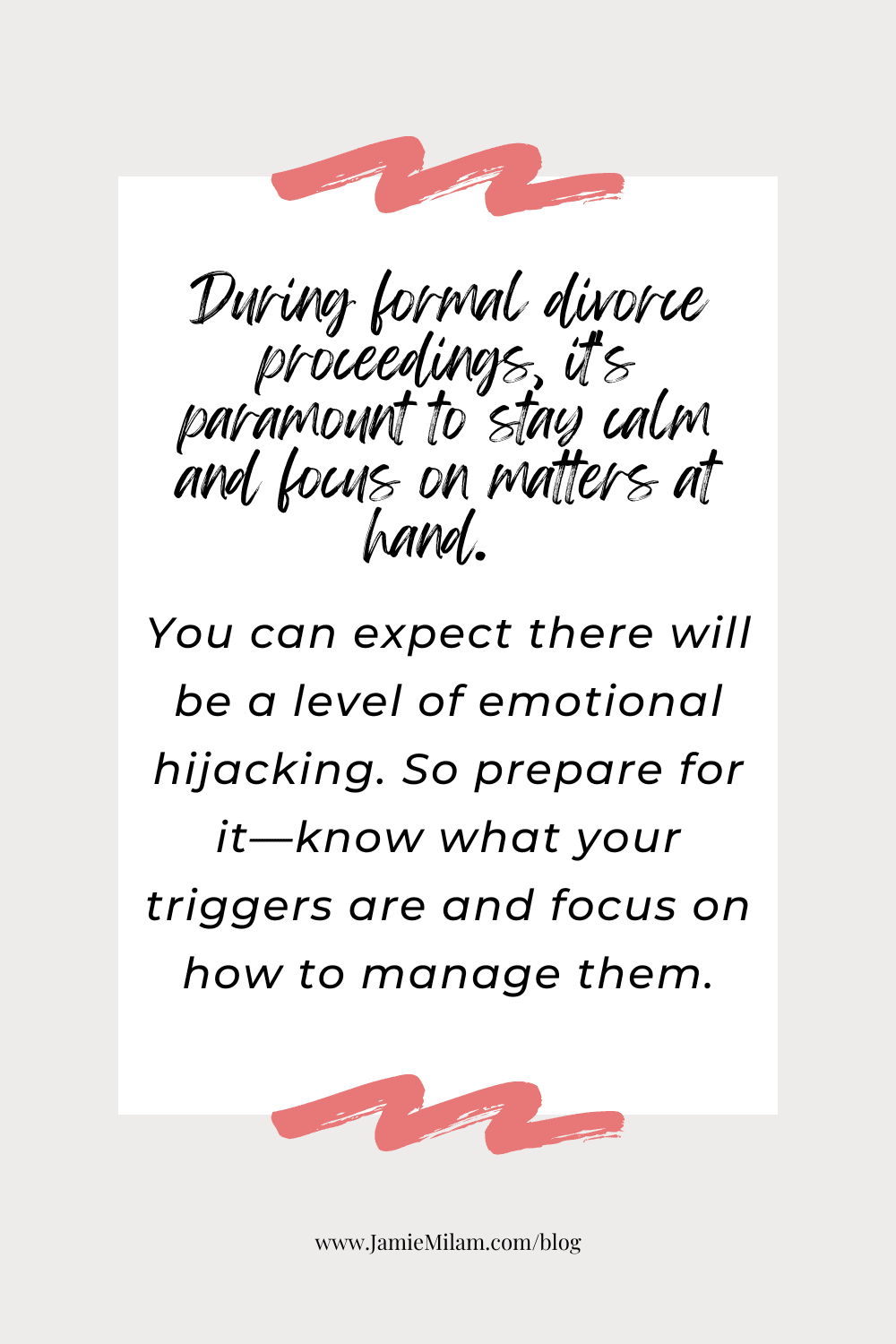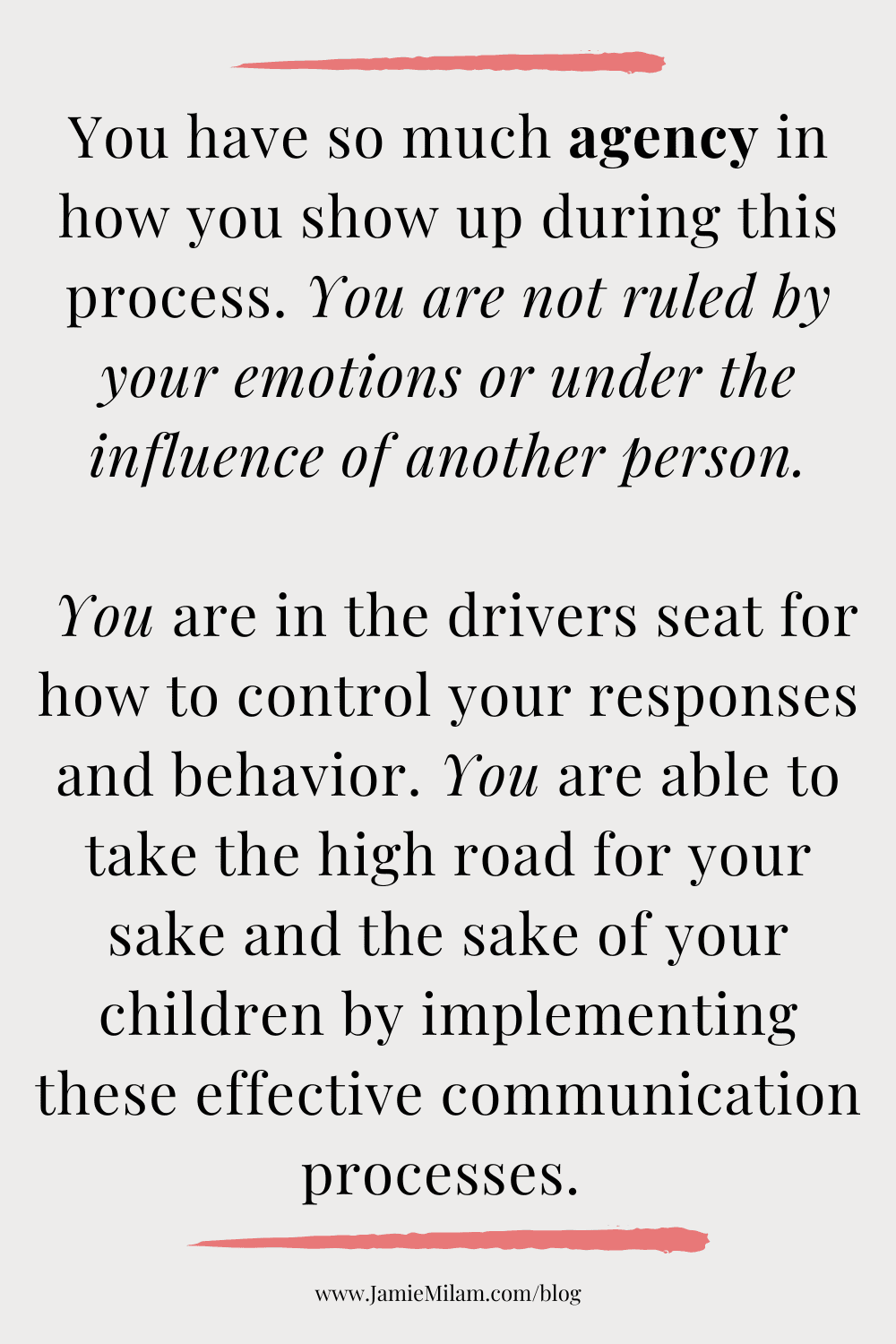THE BLOG
THE BLOG
*This website uses affiliate links which may earn a commission at no additional cost to you. As an Amazon addict and Associate, I earn from qualifying purchases, but I'm only recommending products I love!
Browse More Blog Posts:

How to Communicate With Your Ex During a Divorce:
Practical Tips and Insights
Nothing tests your communication skills and emotional regulation like getting divorced. It's an intense process that amplifies how you work through conflict and communicate under pressure.
And while it's normal to have strong feelings and challenges communicating with an ex, it's so important to handle things well to help set you up well for the future.
Why? Well, if you come in searching for a fight or are completely dysregulated emotionally during your legal proceedings, you can be labeled "high conflict" and have a worse outcome. So, it's important to some short-term pain (biting your tongue to keep the peace) for some long-term gain.
Here we dive into practical insights on communicating with your ex so you can move through the process as quickly as possible.
Understanding the Root of Dysregulated Communication

You're getting divorced for a reason. Many women experience feeling like they don't have a voice or that they're silenced and misunderstood during their marriage. You may feel like your side of things is not represented and you want to defend yourself against accusations from your ex.
The first thing to know is this is valid and normal and expected. You feel wronged and you're perspective is likely misunderstood.
Further, your ex knows you and they know what buttons to push. They know how to get a rise out of you which can trigger emotional responses. And, in the heat of the moment, many people will use that information to get what they want out of the scenarios.
So even if you are totally justified in your feelings and want to defend yourself, legal proceedings during a divorce is not the place to process everything. It's more appropriate and beneficial to speak with a counselor or therapist about everything that's happened during your marriage and divorce so you can find peace and closure.
During the formal divorce proceedings, though, it's paramount to stay calm and focus on matters at hand. You can expect there will be a level of emotional hijacking. So prepare for it—know what your triggers are and focus on how to manage them.
The Consequences of Letting Emotions Hijack Communication
When you're going through a divorce, your amygdala—the emotional center of your brain—is on high alert. Your emotions are all over the place. And it's easy to let it completely hijack your communication.
But there are some big consequences of doing this. So while it's hard to always take the high road and "suck it up" to communicate well (trust me ladies, I get it), it's important to do so. If you don't, you may see these unintended outcomes:
- Challenging relationships with your children: It's especially important to understand your emotional regulation abilities when children are involved. If they always see you and your ex in heated arguments, it can impact their well-being and your relationship with them. Even if they're not direct witness to the argument, you want to avoid talking negatively about their other parent to them or around them, because like it or not, they're still connected to them and you don't want them to feel shame for having a relationship with them.
- Being labeled "high conflict": It only takes one person to create drama and conflict and, when a lawyer picks up on that, you can be labeled "high conflict" which may impact the outcome of your case. You do not want to be the one who starts conflict and leaves a negative impression on the professionals who are working with you. While the label does let professionals know that they have two parties that are not working well together, it can also be a flag to the judge that you aren't able to put your adult differences aside for what's actually best for the children and shield them from this tension.

To avoid these outcomes, you want to take the high road in your communication. That means:
- Focus on the task and conversation at hand, rather than being dragged into a bunch of old issues all the time. Answer only the questions asked, without addressing (or defending) all of the emotional stuff in between.
- Avoid posting anything on social media. Not only can this be used against you in court, but it can further disintegrate your relationships and communication style.
- Be mindful of how you communicate at all times. You need to go into every conversation with a goal to stay emotionally regulated, calm, and clear in communication. This even applies to text messages, which can be used in legal proceedings. Further, some states have one-party consent, which means you can be recorded without your knowledge and it can be used in legal proceedings.
While it's hard to do these things, remember it's for a limited time. You want to keep your emotions in check and communicate them only with trusted, private individuals (very close friends or a therapist) while undergoing a divorce process. This means you can get the best possible outcome and move forward with your life.
7 Practical Tips for Communicating With Your Ex
To avoid emotional hijacking in divorce conversations, you need to have some effective strategies up your sleeve. Here are a few to try out:
- Stick to emails: Texting is very reactive and it's easy to fire something off without thinking about it. To slow your roll a bit, move communications to email. You'll take more time to write out what you want to say and be less reactive. Phone calls should be reserved for emergencies only so, again, you're not going to say something you don't want to.
- Find your safe place: If you ever need to talk on the phone and vent out to a friend or something, choose a private, safe place to do so. It could be your car or a room, but just make sure it's not somewhere anyone else can hear you or—worse—record you.
- Work with a coach: A divorce coach is someone who can walk you through the practical, non-legal steps of your divorce. They can be a neutral sounding board with knowledge and experience about divorce and can help with practical things like how to communicate well via email or respond to questions or accusations.
- Take your time: Unless it's an emergency or has a legit, professional deadline, you do not need to respond to anything immediately. A day or two (hell, I've even taken a week) is always reasonable to respond to an email or question. Remember that your knee-jerk reaction is not the best one, so take your time before responding. If you're super triggered, take a walk, call your therapist, journal, or take some time for yourself before you respond.
- Think of your kids: One helpful mindset shift for divorcing parents is that you should always think of how they may be perceiving your actions and how you want them to see you. Ask yourself if you're modeling, for them, the kind of behavior they'd be proud of and that you'd want them to mirror. Remember that they're observing everything you do—that knowledge may be enough to help you take the high road in your communications.
- Recognize the signs of emotional dysregulation: Learn to tune into your body and mind so you know when you're still emotionally dysregulated and need to work on calming down before you communicate anything. This could be feelings of tension in your body, shortness of breath, ruminating thoughts and obsession, tears, frustration or anger, and an inability to focus. Learn the signs so you can understand your feelings to move forward in the best way possible.
- Talk with a therapist: You need to make space for your emotions in all of this. If you're able, speak with a therapist to help process through everything you're experiencing. It will help prevent conflict escalations because you are processing things on your own terms so you can come to the communication clear-headed.
Communicating with an ex during and after divorce is an imperfect process—it just is. We're all humans trying to navigate deep pain and hurt, so it's going to be a little messy at times.
But, here's the thing—you have so much agency in how you show up during this process. You are not ruled by your emotions or under the influence of another person. You are in the drivers seat for how to control your responses and behavior. You are able to take the high road for your sake and the sake of your children by implementing these effective communication processes.
If you are looking to dive deeper into these topics, you can listen to episode 76 of Divorced and Determined AF about emotionally charged communication, or episode 69 where we interview Divorce Coach Christina Butler to hear her amazing insights. You can also equip yourself with knowledge and information over at the P.E.A.C.E of Mind Initiative.
To taking the high road,

Save this post to come back to or share with a friend!

About Me
I'm Jamie Milam, a determined AF woman who's embraced life after divorce by finding peace through self-awareness, intentional decision-making, and thrilling new travel adventures.
As a Realtor® in Charlotte, NC (and your connection to top agents nationwide), I’m passionate about guiding you through your homeownership and design goals—while also helping you create space for the things you love. My mission is to empower you to create a life of alignment too - at home, abroad, and within.
Whether it’s through real estate tips, home design inspiration, or solo travel experiences for divorced, independent women, I hope this space encourages you to discover deeper self-awareness and build a life that aligns with your passions and needs.
Have you scoped the podcast series that empowers women to make aligned decisions in a divorce?

Your Free Charlotte City Guide

Jamie Milam is a Realtor® in the Charlotte, NC area, licensed in both NC & SC, and has the ability to refer you to a number of agent partners across the nation, regardless of where you may live. She is an enthusiast for the power of awareness and believes it can be used in all facets of life to support aligned living.
**Disclosure** This post may contain affiliate links and they are at no additional cost to you, though I may earn a small commission. Don't worry, I only recommend products or services that I have tried or believe would be of great value to you! All opinions expressed are those of my own!
Recent Posts
There's More ▾
There's More ▾
Let me share the goods!
Come from contribution, that's a motto I've valued for years! So... that's exactly what I am to provide you, straight into your inbox each week! No fluff and all open-book. Inspiring you to practice awareness, value your authentic self, and implement strategic actions so you can create alignment in your world to live the life you desire and deserve!









